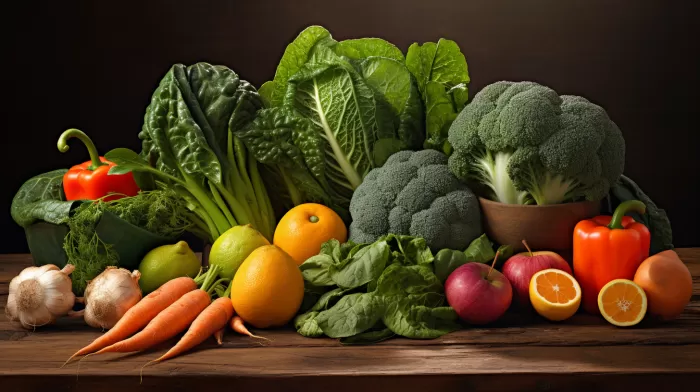Hip fractures can have disastrous consequences for the elderly. In fact, 20 percent of seniors who experience a hip fracture pass away within a year, while another 33 percent suffer from physical impairment and lose the ability to live independently. But there’s good news: recent research suggests that consuming more fruits and vegetables rich in carotenoids could potentially lower the risk of hip fractures in men.
Carotenoids are plant pigments that give certain fruits and vegetables their distinct colors, such as the orange in carrots and the green in collard greens. By increasing the intake of total vegetables and carotenoids, men may be able to reduce their risk of suffering hip fractures. The study found that the protective effect was greater for lean men than for those who were overweight. Interestingly, the research found no association between the intake of vegetables or carotenoids and hip fracture risk in women.
The Benefits of Carotenoids
Carotenoids are powerful antioxidants that play a crucial role in maintaining overall good health. They may protect against certain chronic conditions, such as cardiovascular disease and cancer. Moreover, carotenoids have been shown to support the immune system, promote healthy skin and eyes, and protect against age-related macular degeneration.
To maximize the benefits of carotenoids, it’s crucial to consume a variety of fruits and vegetables every day. By doing so, you’ll provide your body with an array of carotenoids, each with their unique health benefits.
Top Carotenoid-Rich Foods
You can find carotenoids in many fruits and vegetables, but some are particularly rich in these powerful antioxidants. Here are some top carotenoid-rich foods that you can incorporate into your diet:
- Sweet Potatoes: These delicious tubers are rich in beta-carotene, which has powerful antioxidant properties and supports healthy skin, eyes, and immune function.
-
Leafy Greens: Spinach, collard greens, and other leafy greens are packed with lutein and zeaxanthin. These carotenoids are especially beneficial for promoting eye health and have been linked to a reduced risk of cataracts and age-related macular degeneration.
-
Carrots: Along with sweet potatoes, carrots are a fantastic beta-carotene source. Aside from promoting eye health, beta-carotene may also play a role in the prevention of heart disease and certain types of cancer.
-
Tomatoes: Rich in the antioxidant lycopene, tomatoes have been associated with a reduced risk of prostate, lung, and stomach cancers. They’re also a good source of vitamin C, potassium, and folate.
-
Bell Peppers: Yellow and red bell peppers contain high levels of alpha-carotene, which may support a healthy immune system and protect against certain cancers.
How to Boost Your Carotenoid Intake
Incorporating more carotenoid-rich foods into your diet is simple. Here are some easy ways to boost your intake:
- Toss a handful of leafy greens into your morning smoothie.
- Swap out regular potatoes for sweet potatoes or offer them as a side dish at dinner.
- Snack on carrot sticks, bell pepper slices, or cherry tomatoes with hummus or another healthy dip.
- Add colorful vegetables to your favorite pasta dishes, stir-fries, or salads.
- Be sure to eat a variety of fruits and vegetables, as different colors typically signify different carotenoids.
Cooking Tips for Maximizing Carotenoid Absorption
Certain carotenoids, such as lycopene and beta-carotene, are fat-soluble, meaning that they’re absorbed best when consumed with a source of fat. Some cooking methods may also increase the bioavailability (absorption) of carotenoids in your diet. For example, cooking tomatoes releases more lycopene than when eaten raw.
Here are some tips for optimizing your carotenoid absorption:
- Add a healthy fat source, such as olive oil or avocado, to your salads or vegetable dishes.
- Lightly cook vegetables that are rich in carotenoids, such as carrots, spinach, and sweet potatoes, to increase their bioavailability.
- Make homemade tomato sauce using crushed tomatoes, garlic, olive oil, and your favorite herbs and spices. This will not only provide a tasty, nutrient-dense sauce for your pasta dishes but also ensure that you’re getting maximum lycopene benefits.
- Eat both raw and cooked fruits and vegetables to ensure you’re getting a variety of compounds in your diet.
Conclusion
By incorporating a wide variety of carotenoid-rich fruits and vegetables into your diet and preparing them in a way that optimizes their absorption, you can harness the many benefits that these powerful plant pigments have to offer. In addition to potentially reducing the risk of hip fractures in men, a diet rich in carotenoids may help support overall good health and prevent chronic diseases. So, eat your fruits and veggies and enjoy the benefits that come with a colorful and nutrient-dense diet.



